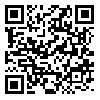2- Assistant professor, Psychiatric Nursing & Rehabilitation Dept. University of Social Welfare and Rehabilitation Sciences, Tehran, Iran( Corresponding Author), Tell: 09125071144 Email: fallahi@uswr.ac.ir ,
3- Lecturer, Psychiatric Nursing Dept. University of Social Welfare and Rehabilitation Sciences, Tehran, Iran
4- Associate professor, Biostatistics Dept., University of Social Welfare and Rehabilitation Sciences, Tehran, Iran
Background and aims: more than one third of Iran's population is under 18 and prevalence of aggression in this group is high Because of the important role of adolescents as the architects of the future of countries, aggression should be considered as a very serious matter as it can adversely affects their physical and mental health.
The aim of this study was to determine the effect of anger management training in groups on aggression of 12-15 years old male students.
Material and Methods: This study is a semi-experimental research and 60 male students, aged between 12 and 15 years old were selected based on multi-stage random sampling. Measurement tools of the research included: demographic data questionnaire and Eyscenk aggression questionnaire. The resulted data were analyzed by means of SPSS software.
Results: The comparison of mean aggression between both groups before and after intervention using independent T test showed that immediately after intervention a significant statistical difference appears between two groups (p= 0.000). There were also correlations between aggression and many of demographics.
Conclusion: The findings of this study indicates that anger management training in groups has an impact on the aggression of 12 - 15 years old male students and this intervention could by applied in other situations dealing with adolescents.
Received: 2011/10/1 | Accepted: 2014/08/25 | Published: 2014/08/25
| Rights and permissions | |
 |
This work is licensed under a Creative Commons Attribution-NonCommercial 4.0 International License. |


